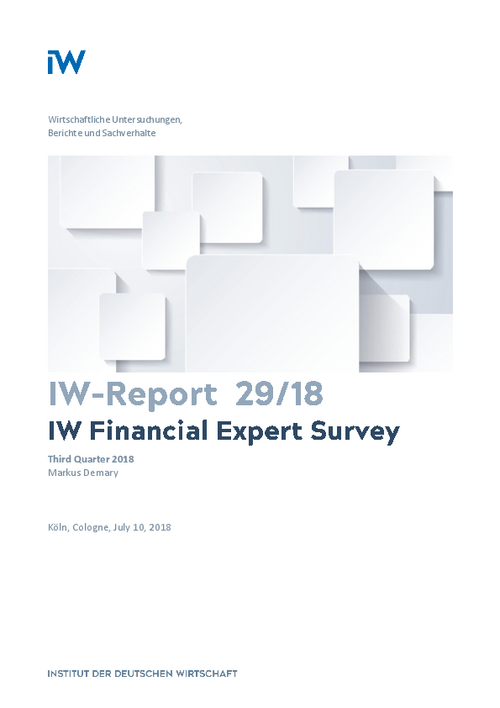The experts of the IW Financial Expert Survey predict a steeper yield curve with a larger increase in long-term than in short-term interest rates by the end of 2018. Moreover, the average forecasts indicate higher stock market indices, a mild depreciation of the Euro vis-à-vis the US-Dollar, but a larger drop in oil prices by the end of the fourth quarter of 2018.

Third Quarter 2018: IW Financial Expert Survey
IW-Report

The experts of the IW Financial Expert Survey predict a steeper yield curve with a larger increase in long-term than in short-term interest rates by the end of 2018. Moreover, the average forecasts indicate higher stock market indices, a mild depreciation of the Euro vis-à-vis the US-Dollar, but a larger drop in oil prices by the end of the fourth quarter of 2018.
However, despite the expectation of higher interest rates, the short-term interest rate is predicted to remain in negative territory. The 3-month Euribor is, on average, expected to reach -0.31 percent at the end of the fourth quarter of 2018, while the yield on German government bonds with 10-year maturity is expected to reach 0.75 percent by then. Stock markets are, on average, expected to increase by 6.8 percent (Stoxx 50) and 9.4 percent (DAX 30) until the end of the year 2018. During that same period, the experts predict a mild depreciation of the Euro by 0.89 percent vis-à-vis the US Dollar, while oil prices are expected to drop by 9.0 percent.
The expectation of an increase in the long rate and a slight increase in the short rate, together with the expected delayed monetary tightening of the ECB, hint at a financial market outlook characterised by a cautious approach to monetary normalisation. In this cautious approach, the ECB lets the market determine the first increases in long-term interest rates before it stops intervening at the long end of the yield curve, while keeping the short end of the yield curve lower. This cautious approach to monetary policy normalization is reflected in the projection of the yield curve. Moreover, the experts expect that the development of the Euro and the development of oil prices as well as the development of the stock market will support the ECB’s cautious approach to monetary normalization instead of forcing a faster exit from low interest rates.
Each quarter we ask the participants alternating questions on current topics. At this time, we were interested in their opinion on the proposed Euro area reforms. The majority of the surveyed experts is of the opinion that a European monetary fund is needed in the Euro area. Moreover, a majority of the same size thinks that macroprudential policies are worthwhile for stabilizing the Euro area. In addition to that, the same majority sees the need for insolvency procedures for states. A small number of experts only sees a European finance minister and the introduction of sovereign-bond-backed securities as worthwhile. These proposals have the highest number of experts who think of them as counter-productive.
The evaluation of the forecasting performance of the latest forecasts yielded the result that Deutsche Bank performed best in predicting trends in the long-term ranking, which covers all forecasts from March 2015 to March 2018. The experts of Deutsche Bank also performed best in the short-term ranking, which covers the surveys from December 2017 and March 2018 for the 3-months ahead prediction and the survey for December 2017 for the 6-month forecasts. When it comes to point prediction, in the long-term evaluation of the period running from March 2015 to March 2018, the experts of National-Bank performed best in predicting all indicators, while the Commerzbank experts produced the most precise point forecasts for all indicators for the short-term evaluation period.

Markus Demary: IW Financial Expert Survey – Third Quarter 2018
IW-Report

More on the topic

IW Financial Expert Survey: First Quarter 2018
The IW Financial Expert Survey for the first quarter of 2018 revealed that the surveyed experts predict, on average, higher interest rates and stock market indices, a depreciation of the Euro vis-à-vis the US Dollar, and lower oil prices by the end of the ...
IW
The Impact of Demographics on the German Retail Market
In recent years, net migration reached a new peak in Germany. Between 2011 and 2015, net migration amounted to more than 2.7 million people. This influx of people has had an impact on society, on the economy in general, and on most businesses.
IW